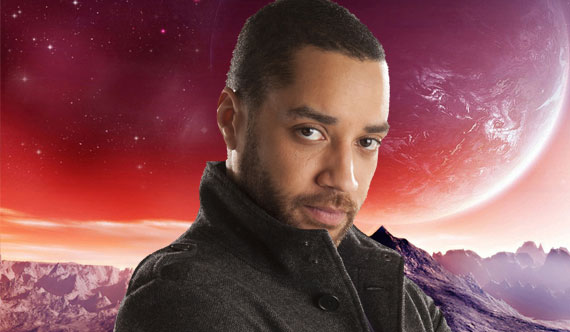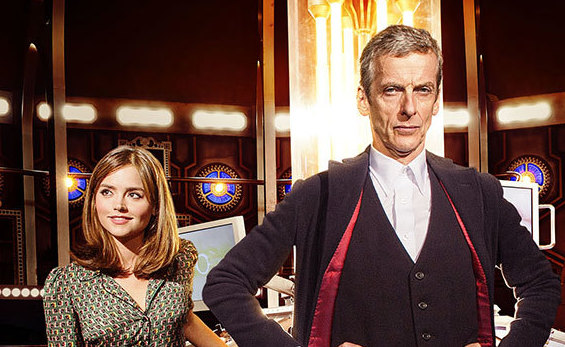**So, I must say that the majority of this article was written pre-episode 8, “Mummy on the Orient Express,” which I believe changed a few of the things below, for the better.**
We, friends, are 7 episodes into Series 8 of Doctor Who. Boy, I really am digging Peter Capaldi as the Doctor. He’s gruff and (perhaps) unaware of how mean he comes off. Yet, there’s still that edge of whimsy, and that underlying sense that he’s still discovering things. And when the story calls for a bit of gravitas, he pulls it off in spades. I would follow that man to the edge of time and back.
And now for the drop.
Series 8 (Season 8 to us stateside) has honestly been a tad of a disappointment. While I’ve loved the new darker, more cinematic feel of the series in general, it hasn’t quite struck a chord with me yet. I wasn’t sure why, and after every episode, I’d sit and think, “I liked that episode, but there’s just something not going right with the everything as a whole. What is it?” Now, though, after watching “Kill the Moon” it’s become rather clear – and it all has to do with Clara.
Here’s what I mean:
Part of, well, almost central to the charm of the 2005 revived series is the relationship between the Doctor and his companion. That relationship has taken many forms, from ambiguous love interest, to headstrong adventuring partner, to massive third wheel. No matter what the relationship, though, it has been for the most part clearly defined. Not so with Ms. Oswald.
Let’s go back to to Series 7. Clara is “The Impossible Girl.” For the entirety of that series she is not so much a character, but a puzzle that needed to be solved. By the time it does get solved in “The Name of the Doctor,” the relationship takes a back seat to the advent of the War Doctor, the end of the Time War, and the Eleventh Doctor’s regeneration. Don’t get me wrong, I loved those episodes, but part of me wanted to just see the Doctor and Clara on an adventure, without having to deal with an unknown looming doom.
So, we get to the Twelfth Doctor, and now we’ve got to re-establish the relationship between Doctor and companion, right? Yeah, totally. Well, kinda… Sure, we get the line, “Clara, I am not your boyfriend,” from the Doctor in “Deep Breath,” but that just defines what the relationship is not, rather than what it is. And what it feels like, right now after 7 episodes, is that Clara’s relationship with the Doctor is that of a weekend warrior. She plays in a club softball league, and the Doctor is the team captain. Hell yes it’s fun, and exciting, and sometimes yeah… you feel a crazy rush when something big happens. But, at the end of the day, despite all the great experience and camaraderie, it’s still an optional activity for her. She has a complete other life outside of the Time Lord’s antics. Remove the Doctor from the show equation, and what have we left? We have Clara Oswin Oswald, teacher, shaper of young minds, head squarely set on her shoulders, in love with Mr. Danny Pink, former soldier, learning to deal with civilian life. That, for all intents and purposes is a sound, complete show premise. And that has been the primary the primary drive of so much of the long-arc tension in the season: Clara’s relationship with Danny Pink.

Cool, I guess. But this show is about the Doctor, I’m afraid.
It’s something that comes up in improv a lot. If we see two characters in a scene, and they’re talking about a point of importance that exists outside of the relationship between said characters, then it feels not as important. Same goes for when much of the action and arc happens in a relationship that exists outside the one we’re tuning in to watch, namely the Doctor and his companion. It leaves someone like me sitting there and wondering, “Why am I watching this?”
Well, what about Rory, you might ask. Well, the difference between Danny and Rory is the fact that we were introduced to Rory very early on, in the first episode of Series 5. We already knew from the top that he was an integral part of Amy’s life. Moffat and crew did very well with presenting, “Here, this relationship exists.” And because it was done so clearly from the beginning, it was something that could be dealt with, and the story could freely move forward from there.

With Clara and Danny, we’re watching this relationship develop. Will they get together? Do they really like each other? Oh, what if the Doctor finds out? Unfortunately, it sat for 5 episodes, us watching that relationship happen outside of the Doctor’s sphere of influence, until “The Caretaker.” True, perhaps it didn’t take up that much screen time, but when you’ve got Clara on about getting back to her important date on time, it starts painting a picture of where the character’s priorities lie.
Like I said earlier. The Doctor feels optional to her right now. She’s got a whole life to live outside of his universe-saving capers. With previous companions, there has always been that need, that yearning to find and accomplish something bigger than themselves. They have always been people stuck in the mundaneness of the everyday, searching for a way out they didn’t know they wanted – until the Doctor came along. I’ve never gotten that sense from Clara. She’s always come across rather glib about it all, which was quite refreshing, actually. However, that can only last so long before we as an audience start questioning whether she wants to be here in the first place. Maybe she’s said it before, but telling is one thing; showing is another.
So, when we get Clara’s emotional “breakup” at the end of “Kill the Moon,” it comes off a little unwarranted, and leaves a taste of, “Well, bugger off then. Not sure you wanted to be here, anyway.”
Alas, we’ve a few more episodes to go until the finale, and so much can change in an instant. I still hold on to hope, much like with Agents of S.H.I.E.L.D., that a turn is coming. And it’s gonna be good.
Addendum, post “Mummy on the Orient Express.”
Dammit, now that’s what I’m typing about! That’s all I think I wanted this entire season. I just wanted to see a good old Doctor + Companion adventure without a Danny-Clara b-plot dangling over our heads. All of a sudden, it feels like there are stakes again, and that’s a good thing.

